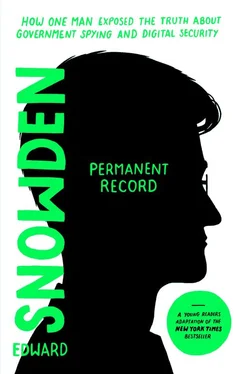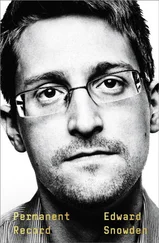In school, I’d had to memorize the preamble to the US Constitution. Its words lodged in my brain alongside John Perry Barlow’s “A Declaration of the Independence of Cyberspace”:
We are creating a world that all may enter without privilege or prejudice accorded by race, economic power, military force, or station of birth.
We are creating a world where anyone, anywhere may express his or her beliefs, no matter how singular, without fear of being coerced into silence or conformity.
This internet revolution wasn’t happening in history textbooks. My generation could be part of it as long as we had the technological knowledge and abilities. But in order to flourish, I had to specialize. I could have become a software developer or, as the job is more commonly called, a programmer, writing the code that makes computers work. Alternatively, I could have become a hardware or network specialist, setting up the servers in their racks and running the wires, weaving the massive fabric that connects every computer, every device, and every file. Computers and computer programs were interesting to me, and so were the networks that linked them together. But I was most intrigued by their total functioning as an overarching system.
A system is just a bunch of parts that function together as a whole, which most people are only reminded of when something breaks. In order to find what caused the system to collapse, you have to start from the point where you spotted the problem and trace the problem’s effects logically through all of the system’s components. Because systems work according to instructions, ultimately when there’s a problem, you’re searching for which rules failed, how, and why.
Over the course of my career, it became increasingly difficult for me to ask these questions about the technologies I was responsible for and not about my country. And it became increasingly frustrating to me that I was able to repair the former but not the latter. I ended my time in Intelligence convinced that my country’s operating system—its government—had decided that it functioned best when broken.
* * *
I had hoped to serve my country, but instead I went to work for it. There is a difference. The sort of honorable stability offered to my father and Pop wasn’t quite as available to me, or to anyone of my generation. Both my father and Pop entered the service of their country on the first day of their working lives and retired from that service on the last. That was the American government that was familiar to me. It had helped to feed, clothe, and house me. That government had treated a citizen’s service like a compact: It would provide for you and your family, in return for your integrity and the prime years of your life.
But I came into the IC during a different age.
By the time I arrived, the sincerity of public service had given way to the greed of the private sector. The sacred compact of the soldier, officer, and career civil servant was being replaced by a transient worker, or contractor, whose patriotism depended on a better paycheck and for whom the federal government was less the ultimate authority than the ultimate client.
However much the work of Intelligence is privatized, the federal government remains the only authority that can grant an individual clearance to access classified information. And because clearance candidates must be sponsored in order to apply for clearance—meaning they must already have a job offer for a position that requires clearance—most Intelligence contractors begin their careers in a government position.
The government job that had sponsored me for my TS/SCI clearance wasn’t the one I wanted but the one I could find: I was officially an employee of the state of Maryland, working for the University of Maryland at College Park. The university was helping the NSA open a new institution called CASL, the Center for Advanced Study of Language.
CASL’s ostensible mission was to study how people learned languages and to develop computer-assisted methods to help them do so more quickly and better. The NSA also wanted to develop ways to improve computer comprehension of language. The agency was having a tough time ensuring that its computers could comprehend and analyze the massive amount of foreign-language communications that they were intercepting.
I don’t have a more granular idea of the kinds of things that CASL was supposed to do for the simple reason that when I showed up for work with my bright, shiny clearance, the place wasn’t even open yet. In fact, its building was still under construction. Until it was finished and the tech was installed, my job was essentially that of a night-shift security guard. My responsibilities were limited to showing up every day to patrol the empty halls making sure that nobody burned down the building or broke in and bugged it.
At the time I was still naive enough to think that my position with CASL would be a bridge to a full-time federal career. But the more I looked around, the more I was amazed to find that there were very few opportunities to serve my country directly, at least in a meaningful technical role. I had a better chance of working as a contractor for a private company that served my country for profit. And I had the best chance, it turned out, of working as a subcontractor for a private company that contracted with another private company that served my country for profit. The realization was dizzying.
It was particularly bizarre to me that most of the systems jobs that were out there were private. These positions came with almost universal access to the employer’s digital existence. The US government had restructured its intelligence agencies so that its most sensitive systems were being run by somebody who didn’t really work for it.
The government agencies were hiring tech companies to hire young adults from my generation, and then they were giving them the keys to the kingdom, because—as Congress and the press were told—the agencies didn’t have a choice. No one else knew how the keys, or the kingdom, worked.
* * *
My first major contracting gig was actually a subcontracting gig: the CIA had hired BAE Systems, which had hired COMSO, which hired me.
I never learned what the company’s acronym stood for, or even if it stood for anything. Technically speaking, COMSO would be my employer, but I never worked a single day at a COMSO office, or at a BAE Systems office, and few contractors ever would. I only worked at CIA headquarters.
In fact, I only ever visited the COMSO office, which was in Greenbelt, Maryland, maybe two or three times in my life. One of these was when I went down there to negotiate my salary and sign some paperwork. After the negotiations ended, a man held out his hand and, as I shook it, introduced himself to me as my “manager.” He went on to explain that the title was just a formality, and that I’d be taking my orders directly from the CIA. “If all goes well,” he said, “we’ll never meet again.”
In the spy movies and TV shows, when someone tells you something like that, it usually means that you’re about to go on a dangerous mission and might die. But in real spy life it just means “Congratulations on the job.” By the time I was out the door, I’m sure he’d already forgotten my face.
You know that one set-up shot that’s in pretty much every spy movie and TV show that’s subtitled CIA Headquarters, Langley, Virginia ? And then the camera moves through the marble lobby with the wall of stars and the floor with the agency’s seal? Well, Langley is the site’s historical name, which the agency prefers Hollywood to use; CIA HQ is officially in McLean, Virginia; and nobody really comes through that lobby except VIPs or outsiders on a tour.
Читать дальше












